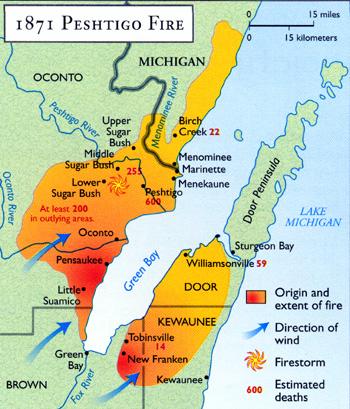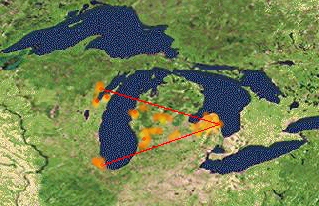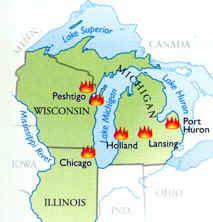
October 8, 1871
 |
The Great Peshtigo Fire October 8, 1871 |
| On October 8, 1871, the Great
Chicago Fire made world headlines. The Chicago fire claimed 250 lives
and had wiped out 1,750 buildings in a 4-square-mile area. About
one-third of the city's population of 330,000 was left homeless;
property damage was estimated at $200 million. Almost to the minute that the fabled Chicago Fire broke out, a more deadly, yet far less famous fire was beginning to rage some 240 miles to the north. Within one hour, the fledging town of Peshtigo, Wisconsin. was leveled. To this day, the Great Peshtigo Fire ranks as the costliest fire in terms of human life in U.S. history. More than 1,200 people perished in the fire that consumed more than 1.25 million acres of forest. The fire also burned 16 other towns, but the damage in Peshtigo was the worst. The city was gone in an hour. In Peshtigo alone, 800 lives were lost. There are 600 people buried in a common grave sight. The damage estimate was at $169 million, nearly the same as the Chicago fire. At the time of its demise, Peshtigo was a booming lumber town. The city was bisected by the Peshtigo River; immense forests began at the town's edge. About 800 of the 2,000 people who lived in Peshtigo worked either in logging or saw milling operations or were employed at a huge woodenware factory that locals liked to boast was the best and biggest of its kind in the world. Many of the population were European immigrants. The Peshtigo sawmill owned by Chicago entrepreneur William B. Ogden ran 97 saws and averaged a daily cut of 150,000 feet of lumber. In the spring and summer of 1871, Peshtigo and other areas had experienced a miserable drought that set the stage for disaster. Indeed, throughout the month of September, the new local paper, the "Marinette Eagle Star," carried several reports of fires in the area's forests and the battle by volunteers to squelch them. On October 7 the paper prophetically reported, "Fires are still lurking in the woods. A pamphlet chronicling the Great Peshtigo Fire gives the following dramatic accounts of that fateful evening. "The smoke thickened, and about nine o'clock a low, moaning, far off roaring of the wind from the southwest was heard." "In less than five minutes there was fire everywhere. The atmosphere quickly grew unbearably warm and the town was enveloped by a rush of air as hot as though it were issuing from a blast furnace. The wind lifted the roofs off houses, toppled chimneys and showered the town with hot sand and live coals. The cries of the men, women and children were scarcely audible above the rumble of exploding gas and crashing timber. People were numb with terror, seeing nothing but fire overhead and all around them." "There was tragic confusion when the frantic, struggling mass of people tried to escape from the fire. Some were trampled under foot; others rushed to the bridge hoping to find safety on the opposite side and then ran headlong into those coming from that side with the same thought in mind." "Many people sought refuge in the Peshtigo River. Refugees in the river tried to avoid the fire rain which came down, exploding in steam all around them. To add to the horror, the woodenware factory erupted like a volcano and sent a shower of burning wooden tubs and broom handles upon the tortured people in the water....While Christian men and women prayed and tried to console their frightened children, the whole village of Peshtigo was wiped out in one hour between nine and ten o'clock." Embers lofted high into the air by the intense fire leaped eastward across Green Bay and burned large portions of forest in Door County. More than 1,200 people were left dead in the fire's wake, including many who suffocated or burned to death seeking refuge in wells. Sadly, the much needed rain fell on October 9 - one day too late. If you've never heard of the Peshtigo Fire before, fear not, for you are not alone. Even in the days and weeks immediately following the calamity, the nation's newspapers paid considerable attention to Chicago's disaster while devoting sparingly little coverage to the tragedy that befell Peshtigo and the surrounding area. |
 |
 |
| In another, almost unbelievable
coincidence, on that same day, October 8, 1871, a huge forest fire
began
in Michigan and burned more than 2.5 million acres over an area
spreading from Holland on the West coast all the way to Port Huron on
the East coast. The fire burned for two weeks and took over 200
lives. |
|
Nation Visitors Since March 8, 2013